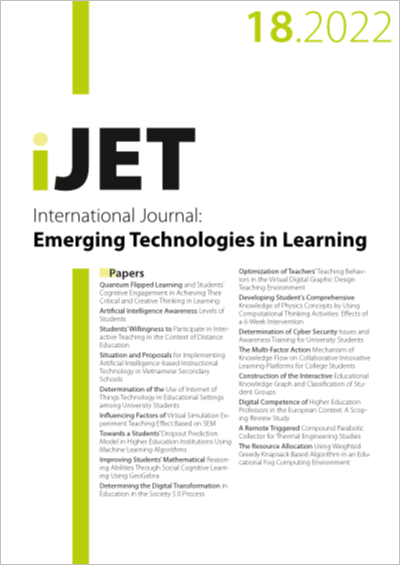Developing Student’s Comprehensive Knowledge of Physics Concepts by Using Computational Thinking Activities: Effects of a 6-Week Intervention
DOI:
https://doi.org/10.3991/ijet.v17i18.31743Keywords:
Computational Thinking, VPython, FCI, Visual Thinking, PhysicsAbstract
Computational thinking has been identified as an important approach for enabling students' better comprehension of science concepts as well as scientific procedures. Computation is useful in physics because it permits physics theories to be applied to issues that are complicated to fix analytically. Visual Python provides a 3D environment where learners may design 3D objects, apply a physical framework, and study the effects of altering parameters. The implementation and outcomes of a 6-week teacher-led computational thinking intervention with groups of 12th graders (n=60) are described in this study. Two research questions are being addressed using quantitative analysis and a quasi-experimental approach involving a pre- and post-test. The participants who received the six-week implementation on the experimental group performed significantly better on the post-test than the control group, which received only standard teaching lectures. The results indicated a statistically significant difference in mean scores between the experimental group (M = 24.03, SD = 4.68) and the control group (M = 20.3, SD = 5.38). The findings indicate that implementing computational thinking activities not only improves students' knowledge of physics concepts, but it also improves visual thinking, allowing students to better cognitively comprehend the problem.
Downloads
Published
How to Cite
Issue
Section
License
Copyright (c) 2022 Ergi Bufasi, Mario Hoxha, Klea Cuka, Dr. Sabahudin Vrtagic

This work is licensed under a Creative Commons Attribution 4.0 International License.


